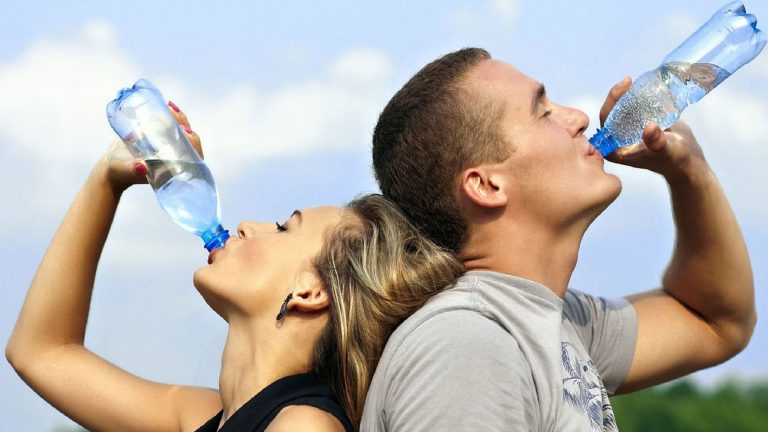Among the benefits of drinking water for the body are: hydration: water keeps the body hydrated so that it can perform its tasks properly. It is clear that water is the best natural way to moisturize the body.
Drinking enough water keeps the brain healthy and functioning properly, and mild dehydration or fluid loss between 1% and 3% of body weight can negatively affect how the brain works.

When the body heats up, the water stored in the middle layers of the skin is released to the surface as sweat. The sweat evaporates on the surface of the skin and cools the body. A sufficient amount of water in the body can help reduce physical stress during exercise when heat stress occurs, but more scientific research is needed on these effects.
Improve joint flexibility: Joint cartilage and spinal discs contain about 80% water, and dehydration can decrease the joint’s ability to absorb shock over time, increasing the risk of arthritis.
Maintain healthy airways: When dehydrated, the body narrows the airways to reduce water loss from the body, which can worsen certain health conditions, such as asthma and allergies.
Several essential nutrients, such as minerals, are dissolved in water, so sufficient amounts of water in the body allow nutrients to reach different parts of the body and meet their needs.
Reduces Bloating: Bloating is an uncomfortable health condition caused by poor digestion or excessive sodium intake. Drinking during the menstrual cycle is also associated with hormonal fluctuations in women, which is why many people believe they should avoid it. Avoid drinking excessive amounts of water. Bloating However, this is a false belief, as water is a natural remedy to help reduce bloating, and drinking the right amount of water throughout the day is essential to help flush out waste products.
Drink enough water to maintain the integrity of the digestive process and keep it at a regular and comfortable pace, otherwise the risk of constipation may increase. Water consumed during the day is associated with soluble fibers in the large intestine, which increase stool volume, decrease stool stay time, and facilitate elimination when not enough water is consumed. Constipation is caused by body waste products.
Dehydration can increase irritability and decrease feelings of comfort, which negatively affect mood and cause many problems.
Water, along with small amounts of electrolytes, mucus and enzymes, is the main component of saliva, which is essential for breaking down solid food and maintaining oral health. It is important to note that when consuming fluids regularly, the body normally produces enough saliva. As we age or undergo certain medical treatments and medications, saliva production may decrease.
Drinking 500 ml of water can help increase energy levels by activating the metabolism, and a study published in the Journal of Clinical Endocrinology & Metabolism in 2003 found that drinking 500 ml of water can help. This effect started within 10 minutes after drinking the water and lasted for more than an hour in both men and women.
Drinking enough water can reduce the risk of certain diseases, such as exercise-induced asthma, urinary tract infections, high blood pressure, and kidney stones, according to a 2005 study published in Nutrition Reviews.
A 2008 study published in Obesity found a link between increased water consumption and weight loss and fat loss over time. Losing excess weight can be achieved by eating a healthy diet and exercising.
Water intake recommendations
The amount of water recommended per day depends on several factors, including gender, age, physical activity level, weather, health status, pregnancy, and lactation. The table below shows the recommended daily intake of water from beverages if you are breastfeeding, and if you exercise for more than an hour a day, more may be needed. Displays differently:
| age category | Recommended daily amount of water |
| Children 4 to 8 years old | 5 cups which is equivalent to 1183 ml |
| Children from 9 to 13 years old | 7 to 8 cups, which is 1656 to 1892 ml |
| Male and female 14 to 18 years old | 8 to 11 cups, that is 1892 to 2602 ml |
| Men 19 years and older | 13 cups, which is equivalent to 3075 ml |
| Women 19 years and older | 9 cups which is equivalent to 2129 ml |
| pregnant | 10 cups which is equivalent to 2365 ml |
| breast feeding | 13 cups, which is equivalent to 3075 ml |
Drinking too much water has some disadvantages
Each cell in the body needs water to function properly, but drinking too much water can cause water intoxication and serious health consequences, and it is important to note that drinking too much water is impossible. In addition to occurring randomly, it can also happen as a result of drinking too much water during long sports events or intense exercise. When a person consumes large amounts of water, brain cells swell and intracranial pressure rises.
Symptoms usually appear when sodium levels in the body fall below 120 mmol/L, whereas poisoning occurs without any symptoms. Changes in mental state, confusion, inappropriate behavior, delirium, poor body coordination, sodium level decreases further, signs and symptoms of increased intracranial pressure increase dramatically, some vital changes in the body may occur. Symptoms such as high pulse pressure and irregular breathing begin to appear.
What is the best time to drink water?
Drinking water after eating has many benefits.
By drinking water after meals, you can improve digestion, as water breaks down food so the body can absorb nutrients, and water softens stools, which reduces constipation.
How does drinking water before eating benefit you?
By drinking water before meals, you can reduce your appetite and consume fewer calories throughout the day.
When drinking water with food, what are the disadvantages?
According to some reports, drinking water with meals may reduce stomach acidity, but this is not true, since drinking water may improve digestion.


